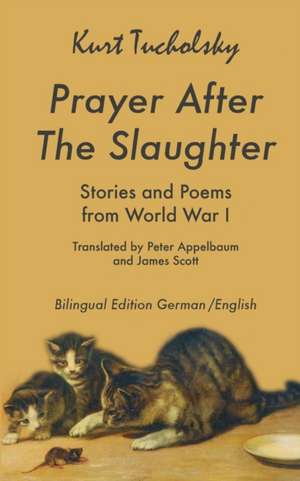Tucholsky, K: Prayer After the Slaughter
en Paperback – 31 aug 2014
Preț: 83.35 lei
Nou
Puncte Express: 125
Preț estimativ în valută:
15.95€ • 16.59$ • 13.17£
15.95€ • 16.59$ • 13.17£
Carte tipărită la comandă
Livrare economică 15-29 aprilie
Preluare comenzi: 021 569.72.76
Specificații
ISBN-13: 9783960260202
ISBN-10: 3960260202
Pagini: 118
Dimensiuni: 127 x 203 x 8 mm
Greutate: 0.16 kg
Ediția:Nouă
Editura: Berlinica Publishing UG
ISBN-10: 3960260202
Pagini: 118
Dimensiuni: 127 x 203 x 8 mm
Greutate: 0.16 kg
Ediția:Nouă
Editura: Berlinica Publishing UG
Notă biografică
Kurt Tucholsky was a brilliant satirist, poet, storyteller, lyricist, pacifist, and Democrat; a fighter, lady's man, reporter, and early warner against the Nazis who hated and loathed him and drove him out of Germany after his books were burned in 1933. His contemporary Erich Kaestner called him a "small, fat Berliner," who "wanted to stop a catastrophe with his typewriter." The New York Times hailed him as "one of the most brilliant writers of republican Germany. He was a poet as well as a critic and was so versatile that he used five or six pen names. As Peter Panter he was an outstanding essayist who at one time wrote topical sketches in the Vossische Zeitung, which ceased to appear under the Nazi regime; as Theobald Tiger he wrote satirical poems that were frequently interpreted by popular actors in vaudeville and cabarets, and as Ignatz Wrobel he contributed regularly to the Weltbühne, an independent weekly that was one of the first publications prohibited by the Hitler government." Tucholsky, who occupied the center stage in the tumultuous political and cultural world of 1920s Berlin, still emerges as an astonishingly contemporary figure. As an angry truth-teller, he pierced the hypocrisy and corruption around him with acute honesty. Imagine a writer with the acid voice of Christopher Hitchens and the satirical whimsy of Jon Stewart, combined with the iconoclasm of Bill Maher. That's Tucholsky in a nutshell. Like Hitchens, Tucholsky wrote a mixture of literary essays, social observations, and political commentary. His irony made the line between his "serious writing" and his "entertainments" almost invisible. The fashionable outsider watched the political "center" disappear, and, in the end, he found himself catapulted out of society altogether. His career was sandwiched between the two most deadly events of his century: the bloodbath of World War I and the scourge of Nazism. Just as the first war launched Hemingway's lifelong career as a wounded tough guy with a soft spot for guns and broads, Tucholsky discovered the reflexes of an escape artist. He was equally elusive as a writer. In today's world, a journalist isn't supposed to write plays, and a playwright isn't welcomed as a novelist. But in 1920s Berlin, Tucholsky was dealing with postwar realities that required shouting from the rooftops, and any rooftop would do.
